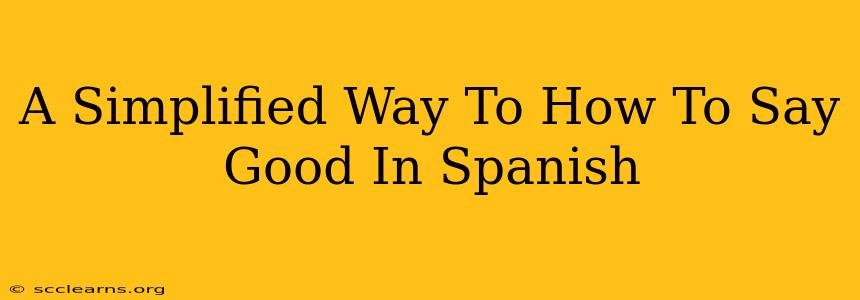Learning a new language can feel overwhelming, but mastering the basics is easier than you think! Today, we'll focus on the deceptively simple task of saying "good" in Spanish. It's not as straightforward as you might imagine, as the best translation depends heavily on the context.
Beyond "Bueno": Understanding the Nuances
While "bueno" is the most common translation for "good," it's not a one-size-fits-all solution. Think of it as the equivalent of "good" in its most general sense – "good food," "a good person," "a good day." But what about other uses of "good"? Let's explore some alternatives:
When "Bueno" Shines:
-
"¡Qué bueno!" This translates to "How good!" or "That's good!" It's an exclamation of approval, perfect for reacting to positive news or a delicious meal. For example: "¡Qué bueno que viniste!" (How good that you came!)
-
"Es bueno." This means "It's good," a simple and straightforward statement suitable for describing objects or situations. For example, "Es bueno para la salud." (It's good for your health).
-
"Buena persona." This means "good person," showcasing "bueno" modifying a noun. It’s a simple and direct way to describe someone with good character.
Beyond "Bueno": Alternatives for Specific Contexts
Sometimes, "bueno" just doesn't capture the precise meaning of "good." Here are some alternatives depending on the context:
-
"Bien" (Good/Well): This word is often used as an adverb, meaning "well." It describes how something is done. For example: "He habla bien español." (He speaks Spanish well). It can also be used as an adjective meaning "good," often in the context of health: "¿Cómo estás? Bien, gracias." (How are you? Good, thanks).
-
"Excelente" (Excellent): This means "excellent," conveying a higher degree of quality than "bueno." Use this when you want to express something truly outstanding. For example: "Tu trabajo es excelente." (Your work is excellent).
-
"Genial" (Great): This informal term is the Spanish equivalent of "great" or "awesome." It's suitable for expressing strong approval among friends or in informal settings. For example: "Esa película fue genial!" (That movie was great!).
Mastering the Art of Context
The key to effectively using "good" in Spanish lies in understanding the context. Ask yourself:
- What am I describing? (An object, a person, a feeling, an action?)
- How good is it? (Just good, excellent, amazing?)
- Is this a formal or informal setting?
By carefully considering these points, you can choose the most appropriate word and sound like a native speaker! Practice makes perfect, so don't hesitate to experiment and expand your vocabulary. ¡Buena suerte! (Good luck!)
SEO Keywords Used:
- Say good in Spanish
- How to say good in Spanish
- Spanish for good
- Bueno
- Bien
- Excelente
- Genial
- Spanish vocabulary
- Learn Spanish
This post uses a conversational tone, incorporates relevant keywords naturally within the text, and provides useful examples to help readers understand the nuances of expressing "good" in Spanish. The structure also enhances readability and makes it easier for search engines to index the content.

